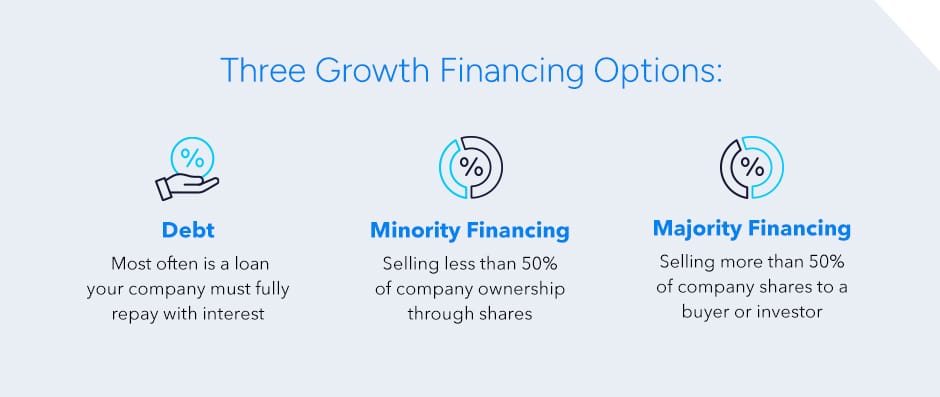Debt vs Equity: 3 Growth Financing Options for Software Companies

Early-stage software businesses may reach a point where they seek resources to help accelerate growth and execute business goals. There are several resources for growth capital: debt from a lender or financial institution, minority equity financing, or majority equity financing through a control transaction. Each method offers different benefits; finding the best option for your software company’s goals is essential to ensure that you clearly understand the landscape and how best to present your business when the time comes to pursue seeking external capital.
Growth Financing Options for Software Companies
Regarding financing, your company can choose between debt, a loan with an associated interest payment, or equity, which involves selling ownership for capital. Software companies may choose a financing option based on their current cash flow, existing debt-to-equity ratio, future growth goals, or accessibility of financing sources for their business.

1. Debt Financing
If your priority is to preserve equity with existing shareholders in your software company, growth debt financing through an individual or institutional lender is a viable option. There is a wide variety of early-stage lenders: large institutional investors, boutique specialist lenders, and high-net-worth individuals are common sources of debt financing.
Growth debt, also called venture debt, most often comes as a principal loan accompanied by an interest payment. Several types of debt financing exist, including recurring revenue lending, non-bank cash flow lending, and loans from financial institutions. You can also sell debt instruments such as bonds, bills, or notes to investors to raise capital.
Many smaller, early-stage companies seek debt financing to initiate growth, as it’s easy to leverage a small amount of capital for growth. Growth debt does not require giving up a portion of ownership in your company, though there are variations of debt (such as convertible notes) that combine debt with the potential for equity. Lenders also tend to have a less direct influence on your business decisions than equity holders (though there are exceptions), which is an important consideration for some software companies.
However, your organization will be responsible for paying monthly interest payments and staying in compliance for the duration of repayment. So, you must ensure your business has sufficient cash flow to meet your obligations, and the controls and reporting necessary to show the ability to meet those debt obligations.
Companies that choose debt as a growth financing alternative will have a debt covenant with restrictions and stringent reporting requirements, such as monthly or quarterly updates, to ensure your company meets its obligations. A debt covenant is necessary since the lender does not have your company’s equity to fall back on. It also helps align interest between debt holders and borrowers.
The recording procedures are far more stringent when seeking debt financing versus equity financing. Your company is responsible for paying the interest payments and continuing to generate the cash flow necessary to show the lender you will be able to meet payment obligations in the future. If your business is sold, liquidated, or bankrupt before this occurs, your debt holder will have a higher claim on your assets than your shareholders and have the legal right to be paid first.
2. Equity Financing
Equity financing involves selling a portion of company ownership through shares to raise capital and have the funds needed to execute your vision. With minority equity financing, you sell less than 50% of your business. This is critical if you want to maintain a level of decision-making amongst owners and operators that are not available in a control transaction.
Minority Financing
Minority equity financing is typically associated with angel investors, early seed investors, venture capital (VC), and growth equity. These investors are often interested in start-ups and emerging companies seeking financing, though it can also be an option for well-established businesses. Minority investors aim to increase value and earn a return on their investment when your business undergoes additional transactions down the line, whether through additional capital raises, acquisition, or an initial public offering (IPO). In exchange for a portion of your company’s shares, the investor’s representatives sit on your board, help you make decisions, and provide capital, expertise, and networks to help fuel growth.
Minority financing is attractive for several reasons; namely, unlike debt, it does not alter the cash flow dynamics of your business. You can secure minority funding without the level of assets or cash flow needed for a bank loan. Additionally, your company is not strapped with a prohibitive interest payment or a debt covenant in exchange for capital. Some early-stage investors, like VC firms or growth equity investors, also act as advisors, helping you make connections in the industry and hire the right talent needed for growth. Working with these investors gives your company operational insight and increases your credibility and validity by leveraging their brand, relationships, and expertise.
On the other side, early-stage investors have a more vested interest in your company than lenders, who are primarily concerned with being paid interest and eventually being paid back the value of the principal loan. They are looking to maximize the value of their investment and, therefore, will give their input on many of your processes, including your hires, business roadmap, strategic positioning, and more. While early-stage investors may voice strong opinions about business decisions that will get you to the next level of growth, their ability to dictate decision-making is less direct, in most cases, as a majority investor.
Majority Financing
The equity option Software Equity Group advises SaaS companies on is majority financing, when you sell more than 50% of company shares to an investor or buyer. This option provides liquidity to shareholders and operators and, depending on the selected partner, can also include capital investment to fuel growth. Majority financing is a strong option for a variety of different scenarios; whether a business is bootstrapped and owned by a few key operators or has received rounds of investment and has a full board, majority transactions enable existing shareholders to remove some (or all) of their capital from the business. This reduces their risk while also providing a partner who can fuel business execution and future growth and is a solution to all types of business and shareholder scenarios.
In general, more established companies seek out majority equity financing. At Software Equity Group, strategic buyers and financial investors are typically interested in majority equity financing for companies that reach the $5M ARR threshold and have previously funded all growth themselves or taken a smaller investment or debt.
By liquidating such a large amount of your company, your goal is to receive a substantial amount of value and money in exchange for a majority, or all, of your share, which is one of the major advantages of this option. In addition, your company gains access to much larger resources from the investor or buyer, as well as operational expertise to help rapidly scale the business to the next level.
Some owners are interested in selling a significant portion of the company, for example, 70-80%, while holding onto 20-30% of the shares themselves and continuing to run the business. In contrast, others are interested in liquidating 100% of shares in a sale and exiting the company. Like minority equity financing, you will not be responsible for an interest payment or debt covenant with this option. You benefit from your investor or buyer’s standing, reputation, and guidance.
The biggest consideration with this alternative is that you no longer own the majority of the company’s shares. Therefore, other parties control the company’s business operations or financial decisions. There’s always the risk that they make choices you disagree with but no longer have the power to overturn. This may be less of a concern for leaders looking to exit rather than stay with the organization.
M&A and Software Equity Group
Software Equity Group helps companies within the software industry achieve their goals of a majority control transaction. Our M&A advisory firm leverages our relationships with a broad list of buyers and investors to find the right match for your business and financing goals.
We understand how every factor of your business, from your product, tech, and performance metrics, to your market timing and positioning, impacts your valuation and whether or not you meet your M&A goals. Our expert advisors strive to highlight our client’s strengths, position around any weaknesses, and guide clients on the best actions to take for a higher valuation and a successful majority equity financing transaction.
Hiring an advisor for your growth financing helps ensure a successful transaction. Contact us to learn how we can help your software company.










